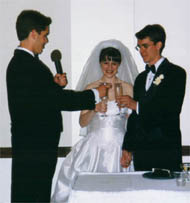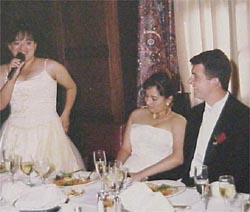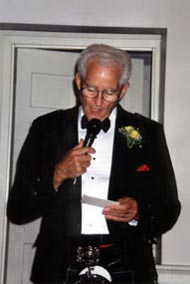The Perfect Wedding Speech
Preparation, Preparation, Preparation!
The best way to ensure that your wedding is a success is lots of good preparation.
This means you have to prepare for any speeches or toasts well in advance. Many people
consider this to be a waste of time and come up with a list of reasons why not to do it.
Here's just a few...
 |
"I'll just stand up and say a few words on the day...it'll be
ok!" |
 |
"It can't be all that complicated to give a quick speech..." |
 |
"I don't have the confidence, I'm all nerves! I can't do it." |
 |
"I'm not a good speaker, I wouldn't know what to say." |
 |
"Let's just see what happens, I have far too many other things to
think about right now!" |
The bad news is - excuses like those can ruin your day - guaranteed!
Speeches at weddings are very often overlooked, not thought out or planned,
and very often poorly exercised. Not to plan what you will say to your friends and loved
ones is perhaps the worse thing you could ever do. Why?
Well, it can literally make or break the bride's memories of the day - one slip of the
tongue or misinterpreted comment can linger in her memory for far longer than all the
rest of the day's events put together. Especially if the poor comment came from a close
family relative.
Did you ever think of that?
And all the other planning and preparation that went into the day could be ruined if
the bride or groom are left to live with the memory of a poor remark - even if it was
accidental!
So it is crucial that you get it right, and you get it right now!
One of the best ways to achieve this is by establishing an order of speaking. Just as a
wedding coordinator would establish what happens and when, you will do the same with
speeches or toasts. If you do decide to use a wedding coordinator and they're willing to
organise your speeches for you - check with them to see if they have any experience. So
remember - to achieve the best result, make sure that you check everything well in
advance.
Allocate a 'Master of Ceremonies'. This person will be the one who introduces each
speaker in turn and will be responsible for establishing the order of running and order
over the audience - to keep them quiet at the right times etc.
Anyone can make a speech, but the most important people to include are:
 |
The Bride |
 |
The Groom |
 |
The Best Man |
 |
The Bride's parents |
 |
The Groom's parents |
 |
Any of the Bride's family members |
 |
Any of the Groom's family members |
There is no strict order of who will do what and when.
If you have no co-ordinator or they have no experience, you could always ask for help at
your local speakers' club. There are many of them all over the country and each one will be
able to help organise your big day.
Make sure each speaker is 100 percent clear on...
 |
What they will say |
 |
When they will say it |
 |
Who is before and/or after them |
 |
If they are to give a toast at the end, or simply say thank you / good
luck / best wishes |
 |
What other speakers will be saying - you don't want too much duplication
between speeches as it lessens the impact the more something is said |
Leading Up To The Wedding...
Here are a few useful tips for you...
Do Practice, Practice, Practice...
Practice anywhere you can! Anytime you can. Live and breath your speech 24 hours a day,
7 days a week. Drill it onto your brain until it sticks forever.
Practice using a Dictaphone for timing purposes and to spot stray 'ums' and 'ers'
Practice in the bath for different acoustics and to amuse yourself and other family
members!
Practice in the car. Practice when you're stopped at the lights to amuse other drivers!
Practice with full notes, partial notes and ad-lib - the art of saying as much as you
can without any notes whatsoever.
Do...
Let every speaker check out the room where you are going to speak - this is so you all
know how loud you will have to be in order to project your voice to every listener. In
fact, speak to the invisible row behind the last row - this always does the trick! The
other thing to watch out for is potential obstructions - any pillars, screens or odd
corners can leave your audience straining to look at you. If there's really nothing you
can do then make a quick joke especially for those people who can't see you properly - it
will be appreciated.
Be personal. Mention names, dates, locations and feelings of any shared experiences
with the bride or groom. This has the potential to be very powerful and emotional if
you leave the humour to one side for a minute. Keep it meaningful and to the point. Pause
for effect after any praising or shared experience. This will give far more
impact to your words and hopefully warm your audience right in their heart.
Imagine your audience naked! - this will put a smile on your face and allow you to have
more fun. Tell them this secret for a few laughs.
Tell them embarrassing things about yourself or a close friend - your audience will
always find this funny.
Practice your speech as many times as possible. Did I mention that you should practice
already? YES!
Rehearse, Rehearse, Rehearse!
Rehearse the order of events with others. If possible and appropriate, try to bring
everyone together who will be speaking. Tell them what will be happening and when - avoid
the temptation to ask them as this often leads to confusion - be firm!
Rehearse each person standing up, giving their speech (it can be one line in
rehearsals), sitting back down and going to the next. You will wonder how you would ever
cope without doing this step!
Rehearse at your local speakers club. Find a club near you and rehearse all of your
speeches. They will be more than willing to help you and can give valuable tips on how to
improve. They will also be the ones who give you your first round of applause - this is
the most encouraging thing in the world when you're a bundle of nerves.
Click here to find a club in the UK
that can help.
On The Day Of The Wedding...
Use these tips, and you'll find that there's less to worry about. You'll always manage
to worry about something, but the more organised you are, the less worry you should have
(in theory!).
Don't...
Drink alcohol. You will look like death if you have a hangover and the performance of
your speech will deteriorate. Let your body recover for at least 48 hours beforehand. The
other reason is due to the fact that it can contract your throat and also hinder your
concentration. If you must have one for nerves or confidence - make sure it is only one.
You don't want to make a fool out of yourself.
Eat a big meal before your speech. The reason for this is because when your body is
processing food, lots of blood moves to your stomach. Leaving little behind to run the old
brain. This may seem amusing, yet it is a proven fact. Your ability to concentrate depends
on how well your brain is working. This is the same reason as why you shouldn't drink.
Have a light breakfast, perhaps cereal or fruit. After that, only eat fruit if you become
peckish. This will give you more energy and improve the sharpness of your thoughts.
Ramble on for too long - keep it within the 5 to 10 minute mark. Try not to make it
last until you begin to hear lots of heads banging on the table due to boredom or sleep!
Keep it short and punchy - everyone will appreciate it. Especially if there's food
waiting.
Try to be funny. Don't try to be a comedian reciting one-liners, instead give lots of
amusing anecdotes to liven people up. Be ready for laughter, but don't force it if you
aren't comfortable.
Do...
Script in the pauses of your speech. A speech delivered with correct pauses is twice as
likely to be remembered than one that has none. The added benefit is that you will also
appear ten times more professional with good pauses for effect. It makes a seriously big
difference! The best speakers in the world use pauses for maximum effect and impact.
Smile, have fun, be confident. Here's some good advice if you aren't feeling confident
- fake it until you make it! Pretend you are confident and your audience will believe it
and no-one will notice you're pretending except you. You may be surprised how easily this
works. Try it... it works!
Remember that you're not taking an exam - you're talking to your friends and family.
They should be the best audience you'll have in your life! Every person is on your
side
Breath deeply! Out of all the tips that are on this page, this has to be the
most important, simply due to the many number of advantages it brings.
It helps to:
 |
Calm your entire body and nervous system - breath deeply outside if it's
convenient for better quality air |
 |
To allow more oxygen into your lungs to help with projection of your voice
and increases the number of words you can say without pausing for breath |
 |
Allows more oxygen into your brain and improve concentration |
Remember that waiting for your turn is likely to make you more nervous - more so than
the actual speech itself. So make sure you calm yourself as best you can with lots of
deep breaths.
actual speech itself. So make sure you calm yourself as best you can with lots of
deep breaths.
A Final Word - Using Notes
Should you use notes? If so, what kind do you use? How much?
This is a very tricky subject and unfortunately there's no correct answer. It depends
entirely on how well you know your speech and how well you can use notes.
The main thing to avoid is writing EVERYTHING out in full. This is a big mistake as
it's obvious to the audience and you can easily get lost with too much writing.
If you do decide to use notes then...
 |
KISS - Keep It Simple Stupid! Keep notes to a useable minimum. |
 |
Don't include too many phrases - a note like LAMP-POST is a far better
note to leading you onto the subject of the stag do than a note saying "everyone
grabbed the groom and ..." |
 |
Print them on card in big, eligible fonts (Times Roman is easy to read)
using a computer. |
 |
Number each note and follow the numbers with your finger if you need to.. |
 |
Number each page - i.e. page 1/7, 2/7, 3/7 and so on. If your notes are
dropped it should only take a couple of seconds to put them back in order. |
 |
Be ready for interruptions at any point! You will definitely impress your audience
when you are confident to mention a - baby crying, sudden door slam, rude noises from
chairs etc. Make sure you remember where you're up to in your speech, make a pleasant joke
out of the interruption and carry on after the laughter. This is very impressive and very
professional. |
If you decide to go without notes then...
I hope you know what I'm about to say. The answer to delivering a good speech without
use of notes is ... practice! Perhaps you could buy yourself a Dictaphone to help analyse
and time your speech.
You can also practice at your local speakers club. Here you will receive plenty
of feedback and human interactions - far more than any electronic Dictaphone! It also
helps give you that 'outsiders' point of view. Practicing in front of family or friends is
alright for a while, as long as you remember that they're not trained speakers and don't
know what to look for and how to suggest improvements. The practice will definitely pay
off when you've practiced in a professional environment.
The Association of Speakers Clubs (ASC) have clubs all across the UK and offer a high
level of training and support. It's a one-stop place to help anyone of any age or sex give
better speeches for all occasions. They offer you bags of encouragement and applause. Most
of our members began with no previous knowledge whatsoever and they know what it feels
like to be give that first nervous speech! Once the initial fear of going to a club has
been overcome, the friendly atmosphere will guarantee a good performance on the big day of
your wedding.
| 

